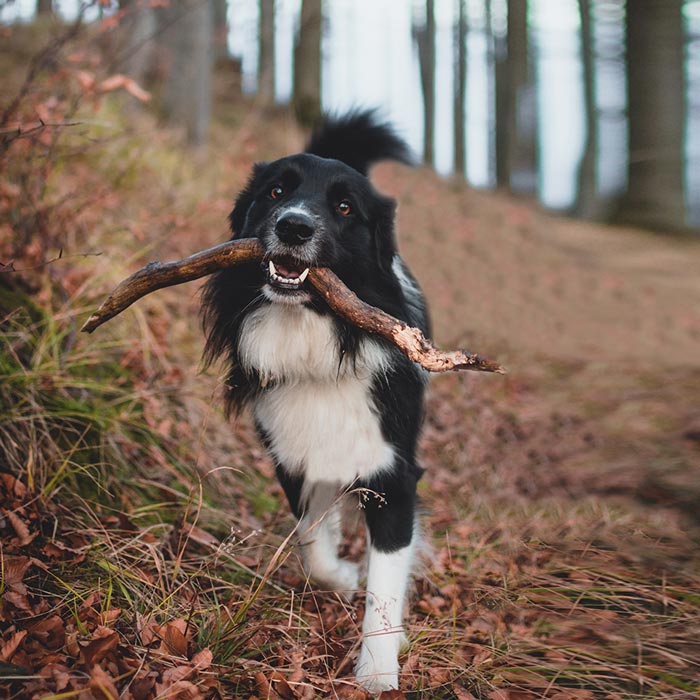Like humans, dogs can have sensitive stomachs. If a dog has a sensitive stomach, it’s important they are given the right food in order to encourage healthy digestion, be able to absorb nutrients and stay healthy and fit. A recurring upset stomach can lead to other problems and cause complications for their health. This is because the strength of your dog’s immune system decreases if they suffer from an upset stomach.
The best type of food for a dog with a sensitive stomach varies from individual to individual depending on the underlying cause of the problem. In general, dogs can react to food that’s too energy-dense, i.e. food with a high fat content. One thing people usually try is changing the type of animal protein and seeing if it works better for their dog.
HOW DO YOU KNOW IF YOUR DOG NEEDS SPECIAL FOOD FOR SENSITIVE STOMACHS?
Your dog’s faeces can give you useful clues as to how its stomach feels. Looser stool over a longer period is a sign that your dog’s stomach isn’t coping well with their current food. Dogs with sensitive stomachs will also react more strongly to changes of food, chew bones and other treats. It takes longer to introduce new food for a dog with a sensitive stomach so patience is required to give them time to adjust. However, you should be aware that if your dog suffers from a bad stomach whilst you are changing foods, it may indicate the food is not suitable.
DIARRHOEA IN DOGS
Occasionally, dogs suffer from diarrhoea or upset stomachs. In most cases, this is completely harmless, and due to something like a change in food or the dog eating something that disturbed the intestinal flora.
It’ll often pass pretty quickly. Something you can do if your dog is showing symptoms of diarrhoea is remove his or her food and wait for things to calm down before giving them any more. Dogs must have access to plenty of water when they suffer from diarrhoea, as they can dehydrate easily. When your dog’s stomach seems to have calmed down, you can start feeding them again or give them cooked rice in small portions. Keep an eye on whether the dog’s stomach starts to react again. If it does, you’ve given it too much food, or too fast.
DOG WITH DIARRHOEA – WHEN SHOULD I SEE A VET?
Keep a close eye on a dog with diarrhoea. If there’s blood in the stool, you should see a vet immediately, or if their general health deteriorates or the symptoms persist. With puppies, it’s especially important to see a vet early in the case of diarrhoea, as the illness can quickly become life-threatening for small puppies if they lose a lot of fluid quickly. Always contact your vet if you feel unsure.
PREVENT YOUR DOG FROM GETTING AN UPSET STOMACH
Preventing your dog from having tummy trouble or getting diarrhoea can be easier said than done. Dogs can be good at finding things to munch on while on a walk, and scraps can easily upset stomachs and leave them with diarrhoea. One of the best tips is to find a food that works in harmony with their stomach and helps to maintain a balanced gut. With a suitable dog food, your pet has greater resilience against the causes of upset stomachs. Also try to keep an eye on your dog when you’re out walking to make sure they do not eat anything they shouldn’t.
BOZITA’S DOG FOOD FOR SENSITIVE STOMACHS
What a dog’s stomach is sensitive to varies from dog to dog, and to find the exact cause, you should contact a vet. In general, very energy-dense food (food that has a high fat content) and certain sources of protein and grains upset a dog’s stomach. At Bozita, we and our nutritionists have developed food for dogs that’s gentle on the stomach.
To find Bozita dog food for sensitive stomachs, visit our dog food page and use the filter function to see our sensitive stomach range.
Further reading





